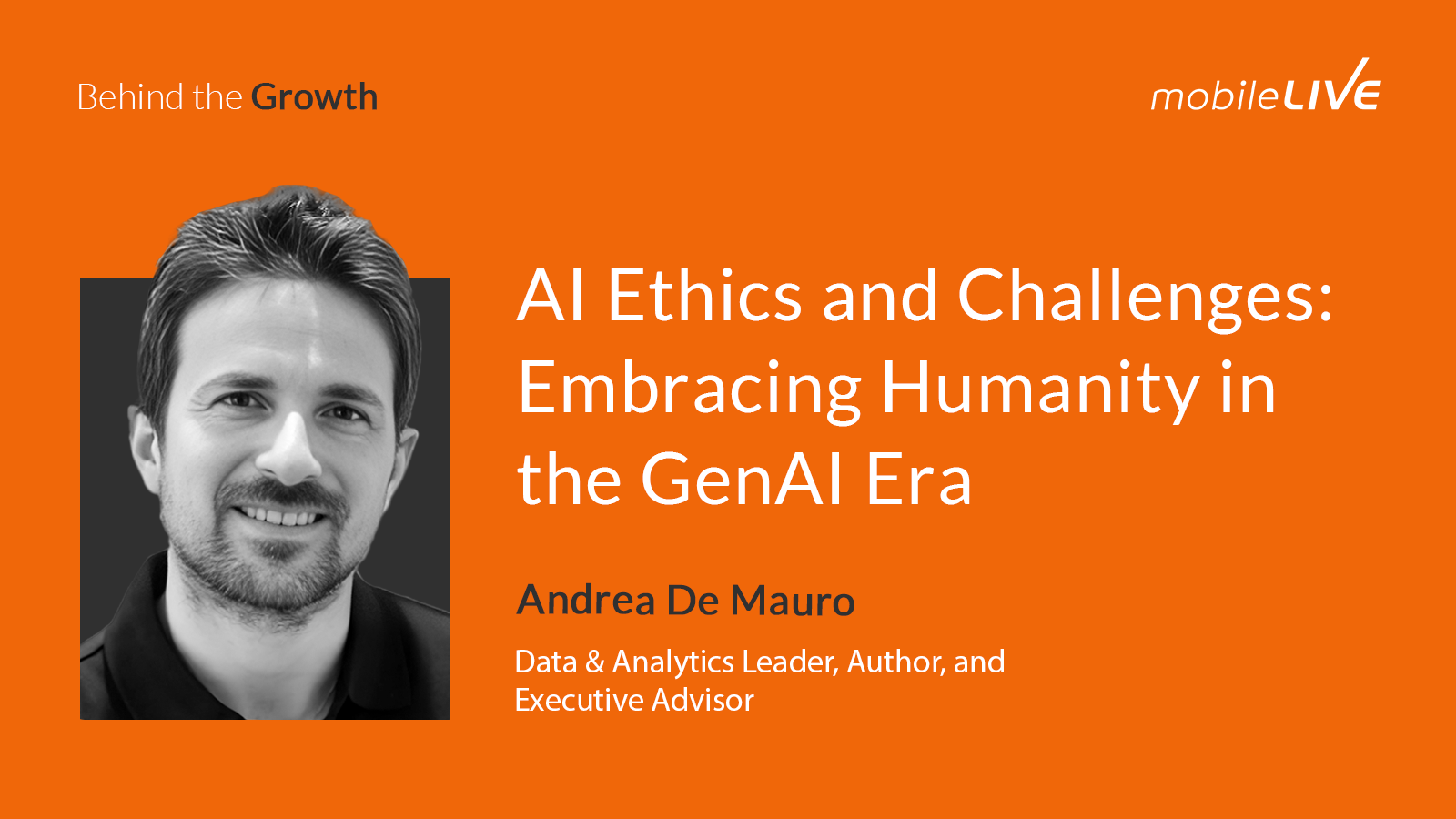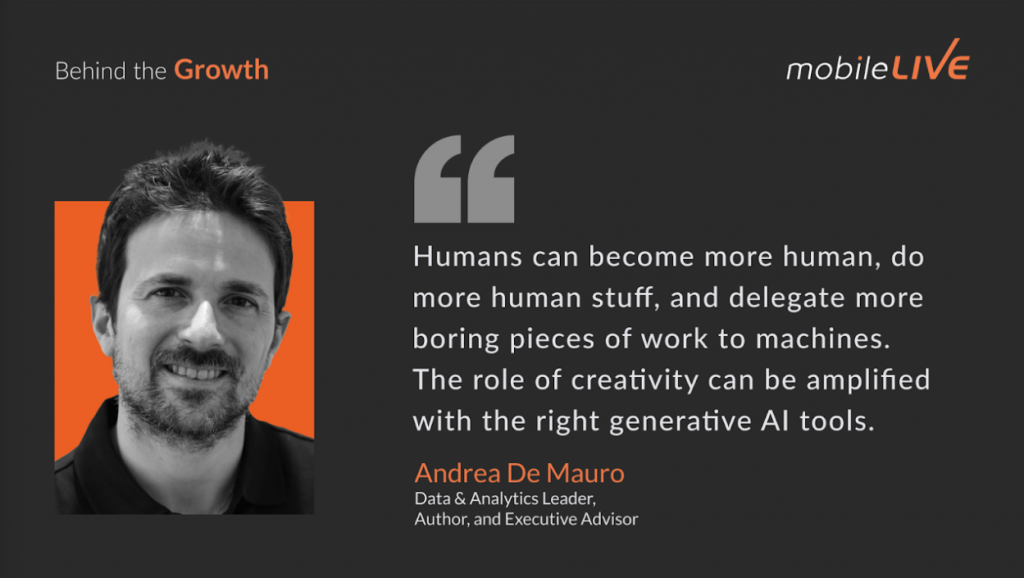
Jump To Section
As businesses evolve, embracing generative AI (GenAI) no longer remains a luxury, but a necessity, making it crucial for companies to identify, envision, and embrace the value of GenAI across the organization.
But the challenge arises when it comes to balancing ethical considerations with the development and implementation of AI technologies.
In a recent episode of Behind the Growth, I had the opportunity to engage with Andrea De Mauro, a renowned Data & Analytics Leader, Author, and Executive Advisor.
Celebrating his vast career and a rich background in Data Analytics – that spans over 18 years and includes building data science and analytics organizations at Vodafone and Procter & Gamble – together we explored the intricacies of GenAI and its human-centric challenges.
Andrea lets us in on his extensive experience of championing ethical data use and innovation while prioritizing the human element, and in this article, I share these invaluable insights that will help you successfully navigate the intersection of technology, business, and ethics.
The Human-centric Challenges of GenAI
With the rapid advancement of Gen AI, there’s a lot of focus on the technical side of things. But the emphasis on technological advancements often overshadows critical human challenges.
While it may seem counterintuitive, the process of data transformation is primarily a human challenge related to organization and culture more than technology and data.
AI may help maximize business outcomes, but organizational support is needed to successfully navigate the transition.
Recognizing this, organizations must address three key human-centric issues beyond the technical realm.
1. Managing Talent
One pivotal aspect is the strategic management of talent, involving clear role definitions, responsibilities, career paths, and skill development for data professionals. Organizations often grapple with retention and recruitment issues when they lack well-defined career progression paths.
2. Organization
The second crucial element involves organizational dynamics, requiring a careful placement of data analytics talents either within centralized units or integrated with business teams. Striking the right balance ensures a conducive environment for continuous dialogue and collaborative value creation between data professionals and business units.
3. Culture
A third and integral aspect is cultivating a data-friendly culture. This involves fostering openness within the organization, where data professionals, including analysts, actively contribute to decision-making processes. Achieving this cultural shift is essential for leveraging data effectively.
The Ethical Use of AI
In addition to human challenges, we must also recognize the need for ethical use of AI. Ethical use of AI demands a clear understanding and codification of its capabilities.
The first step involves meticulously codifying AI functions, allowing organizations to assess their impact on various stakeholders, customers, and employees. This process, although time-consuming, provides a crucial foundation for evaluating the ethical implications of AI applications.
By developing explicit codes of ethics for AI, coupled with comprehensive training, we can ensure a shared understanding across the organization. This approach, exemplified in managing AI-driven tools like chatbots, equips employees to not only use the technology effectively but also be aware of potential risks.
Building fluency in AI, involving a common language and understanding of key concepts, is pivotal for ethical considerations, particularly in recognizing and managing biases that machines can have when making decisions and inferring. Investing in ethical AI capabilities and promoting fluency ensures responsible and informed usage of AI technologies in organizations.
The Crucial Role of People Managers
![it's a good image for the future, but we need to be very careful about [integrating AI] in the proper way and ensuring that it's an inclusive path and nobody is left behind.](https://www.mobilelive.ai/wp-content/uploads/2024/04/word-image-1-1024x576.jpeg)
As AI is evolving, so is the definition of being a manager. The role of people managers becomes pivotal — particularly in navigating concerns about job displacement.
One major shift is evident in decision-making processes, where managers increasingly rely on algorithmic recommendations rather than their instincts. This skill needs to be learned, and it’s up to managers to encourage their teams to be mindful of AI’s limitations.
Amidst these changes, managers of data professionals should understand that data professionals often feel undervalued and burdened by routine tasks, despite aspiring to leverage their skills as transformative agents.
So, managers should alleviate their frustrations by involving data professionals in meaningful conversations, clarifying roles, and emphasizing their role in the ongoing cultural transformation toward data-centric approaches.
By nurturing a sense of inclusion and actively involving data professionals in business discussions, managers can harness their potential as transformation agents in the company’s data culture.
Key to Success: Making the Collaboration Between Humans and AI Work

To successfully integrate AI in their processes, companies need to foster organizational fluency in AI technologies, making sure that everyone — no matter their job — know what AI and Gen AI are about.
A shared understanding of AI helps ease worries and sets the stage for humans and machines working together. When mundane tasks are automated, individuals can channel their efforts into more meaningful and creative endeavours. This collaboration between humans and AI is all about leveraging each other’s strengths for enhanced efficiency and effectiveness.
Success in this collaborative future hinges on establishing a culture of collaboration within organizations. This involves not only understanding AI’s capabilities and ethical considerations but also actively fostering a mindset that encourages experimentation and collaboration between humans and machines.
By cultivating such a culture, we can navigate the evolving AI landscape, where humans and machines coexist, amplify each other’s capabilities, and drive innovation forward.
As this collaboration becomes more established, it offers a positive outlook for the future. However, we need to approach this change carefully, making sure it is inclusive. This is why the fluency program is so crucial — it reaches everyone in the company and fosters understanding and involvement across the board.
Practical Tips for Leaders and Organizations
If you are venturing into the complexities of Gen AI while prioritizing the human element, having a strategy in place can pave the way for a smoother journey. Here are a few tips to seamlessly integrate Gen AI, focusing on inclusivity, skill development, and strategic vision for the entire workforce:
Selecting Impactful Use Cases
First and foremost, envisioning the role of Gen AI within the organization is crucial. This involves selecting impactful use cases that not only demonstrate value to leaders but also to the entire workforce. Gen AI should be perceived as a transformative force for everyone in the organization, debunking the notion that it’s solely for technical experts.
Upskilling Technical Professionals
To facilitate the integration of Gen AI, upskilling technical professionals is imperative. Fluency programs should be implemented, focusing on developing the skills required for working with generative AI. This not only prepares technical professionals but also ensures that the entire workforce is equipped for the integration of new skills and tools.
Inclusive Development Path
Creating an inclusive development path is another vital step. This involves offering education on the basics of AI and Gen AI to all employees. With tools like Microsoft’s Copilot becoming increasingly prevalent, an inclusive approach ensures that the workforce is ready to engage with these tools consciously — with awareness and ethical considerations.
Managerial Involvement
Lastly, leaders are encouraged to stay personally involved from day one instead of delegating the responsibility of Gen AI to technical experts. Seeing their leaders embrace Gen AI will enthuse employees to learn more about it and foster a culture of curiosity and continuous learning.
Takeaway
To enhance collaboration between AI and humans, it’s clear that organizations need to put their efforts towards building AI fluency that ensures responsible usage and recognition of biases in decision-making.
Overcoming human-centric challenges in talent management, organizational dynamics, and fostering a data-friendly culture requires strategic talent management with clear role definitions and skill development.
Moreover, people managers will play a pivotal role in navigating and encouraging algorithmic decision-making, and involving data professionals in meaningful conversations.
The collaboration between humans and AI is crucial and not just a matter of the future: it is a current need that enables businesses to achieve more creativity and efficiency, and it is up to organizations to foster a culture of experimentation and collaboration to make GenAI work for everyone.
If you found this conversation insightful and want to learn more, be sure to tune into the full episode of Behind the Growth!
Find it here:
The Human Element in the Age of GenAI
You can also tune in on your favourite channel:



